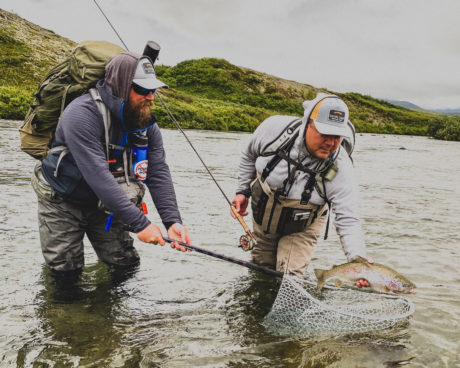
Today we at Deneki Outdoors would like to address people who have never fly fished before and really want to. And why not? It’s super fun. If you’re reading this, you’re probably a seasoned angler, then this post may not be for you. But, if you know someone who is just starting or would like to start, please send them a link to this article as it provides some seasoned advice for someone who wants to learn how to fly fish but may not know where to start.
Fly fishing is a wonderful activity for anyone and everyone willing to learn. It forces you to get outdoors and embrace all that this natural world gives us. Many people are intimidated by fly fishing. They think it’s complicated, technically challenging, and difficult, and will try your patience. These are all true, but fly fishing is also extremely exhilarating, satisfying, and one of the most remarkable experiences anybody can do.
We love fly fishing, and if you’re here, you probably do too. We are grateful for your readership and for using Deneki.com as a fly fishing resource. There are many great tips, tricks, and recommendations on our blog and other internet resources. So a big “Thank you” is in order. If you know people who want to start fly fishing, send them a link to this and help them get started.
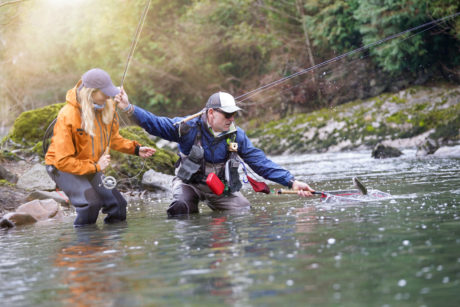
1. Ask The Right People Questions. You can research online on your own all day long. Sometimes it’s much more effective if someone with the right experience guides you and puts you on the right path. While the internet is a great resource for videos, tips, and instruction, it will save you a lot of time and effort if you find an experienced guide and/or instructor right out of the gate. You can equate it to golf instruction. Anyone who has tried teaching golf to a family member understands the frustration and anguish it can muster and ruin the experience. Instructors are instructors for a reason. Not only are they good at what they do, but they are also good teachers, and that is key. The first thing you can do is go to your local fly shop. The local fly shop is in the business of being in the know. It behooves you to use them as your first resource. Any fly shop and their staff worth their salt is more than willing to offer free or inexpensive knowledge and training, especially when it comes to local waters. While they may not be on the water training, but at the very least, they can put you on the right path and will point you in the right direction. Secondly, hire a guide. Not only can they give you the ins and outs of your local waters, but they will also advise you on the proper gear and techniques, all before you even purchased a single piece of equipment.
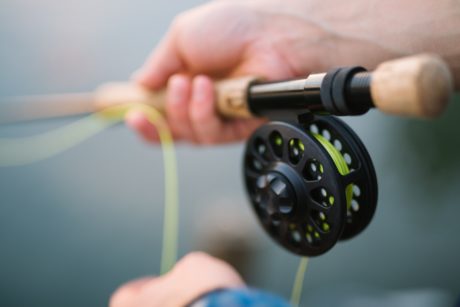
2. Match your Rod, Reel, and Line to Where You Will Fish the Most. After you’ve visited your local fly shop and gone out with a guide on your local waters, now you can start thinking about fly fishing equipment. This can and will be challenging. There is a myriad of choices of rods, reels, and lines. First, you don’t need to spend a fortune on uber-expensive fly fishing equipment. There is something to be said about expensive fly rods, but if it’s not in the cards to get the high-end equipment, don’t. Expensive equipment will not enhance your experience as a beginning fly angler. In fact, starting with less expensive equipment can help you appreciate and “feel” the differences as you continue your journey as a fly angler. Just make sure to match the right equipment that you’ll use the most on your local waters. Again, this is where your local fly shop will be instrumental.
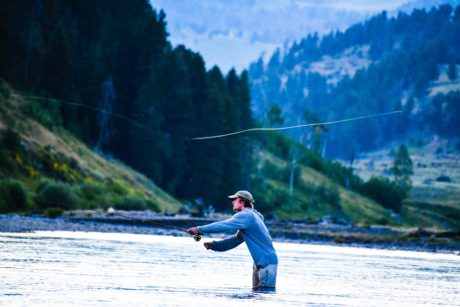
3. Learn How to Cast, and Practice. There are plenty of casting instructions online, but if you can, hire a guide or casting instructor. The old saying “practice doesn’t make perfect. Perfect practice makes perfect” applies. Casting a fly rod is no different. If you start casting with bad habits, it will deter a good experience. Bad casting is a hard habit to break. Learn the correct way, and practice, practice, and then practice some more. Master one basic cast, get proficient at it, and then learn another one.
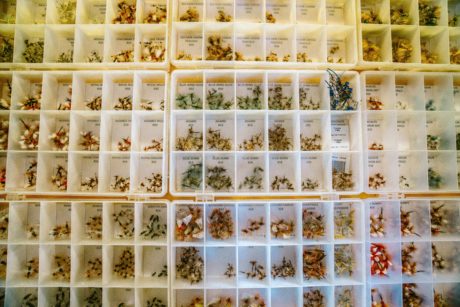
4. Learn about Flies and How to Tie Them. Start with 5 flies. Learn what they represent and when to use them, and why fish like them. This will give you a better understanding of fish habits, cycles, and weather patterns that will impact your day out fly fishing. This is where the internet can help. As for fly tying, trust us, one of the most euphoric feelings you can get is catching a fish on a fly that you tied. Learn a variety of fly patterns so you’ll always be prepared, whatever the hatch. Many fly shops offer fly tying classes and also provide the tools and materials. It’s worth it. When you’re ready to get into fly tying, see what we recommend as essential tools here.
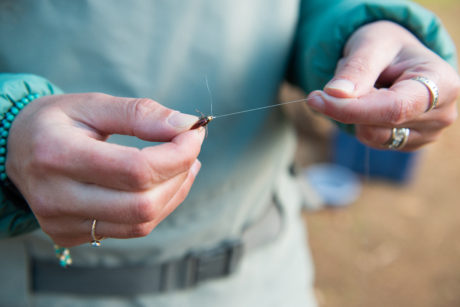
5. Learn Knots. Start with Three. First, learn how to tie a nail knot, so if you break the loop on your fly line, you can attach your leader to your fly line. Second, any other knot that you can attach leader and tippet; Finally, learn a knot to tie on your fly. There plenty of knots out there. Some swear by specific knots because they are the “strongest.” Again, defer to your local fly shop or guide/ instructor to identify the best one for the type of fishing you will do the most, then use the internet for constant instruction to improve your knot-tying skills.
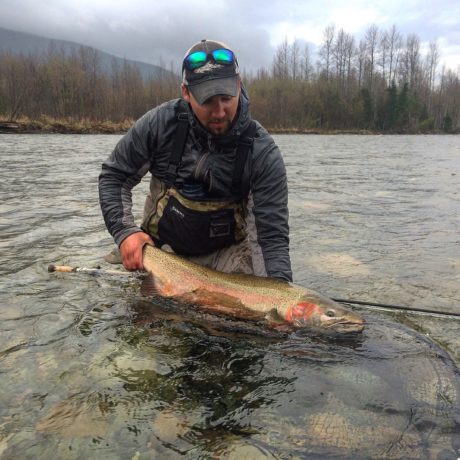
6. Photos and Handling Fish Properly. We get it…you caught your first fish on a fly rod, and you want a picture to commemorate the moment. Just remember, handling fish is a very sensitive topic among fly anglers. Understanding and using proper fish handling techniques is an essential part of being a fly angler. When it comes to fish handling for pictures, it’s best to defer to the health of the fish, even if it means not getting at a picture. You can read here on better fish handling techniques here. It may be your first, but it won’t be your last. You’ll have plenty of opportunities to catch more fish and get a picture.
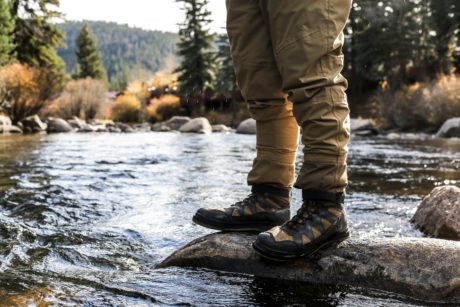
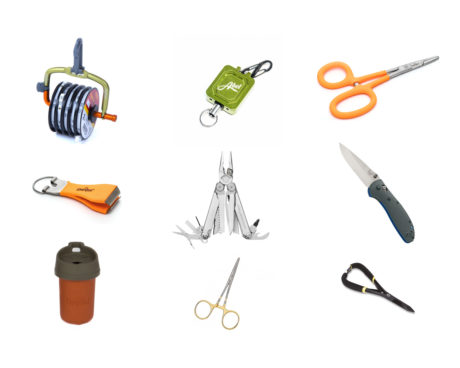
7. Get the Right “Other Gear.” Yes..more gear: waders, wading boots, packs, nets, and riverside tools. Very much like rods and reels, you don’t need the most expensive waders, wading boots, and tools. But when it comes to waders, at the very least, we recommend getting the “best you can afford.” Having waders that will stand up to the elements is critical for fly fishing or any fishing. A cold, wet day will ruin any fly fishing experience. In terms of riverside, tools check out this post on essential tools while on the river.
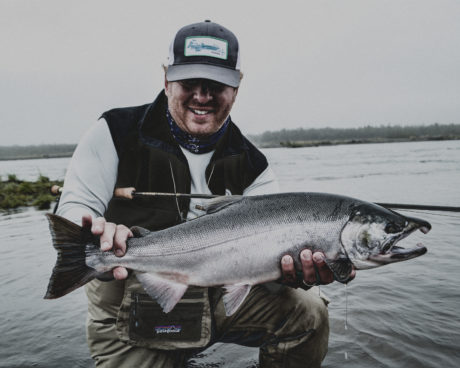
8. Go Fish! The most important aspect of fly fishing is going out and doing it. The best way to gain experience is to go out and do it. The dichotomy of being good at anything and not is how often you try, fail, and learn. If you want to get good at it, do it often, learn from those who are better at it than you are, and always remember…there will always be anglers out there that are better than you are and learn from them.
If you’re a new angler, or even a seasoned one and have any questions we’re here to help. Drop us a line at info@deneki.com and we will, at the very least point you in the right direction! Tight Lines!
Other Tips on Fishing:
Leave a Reply